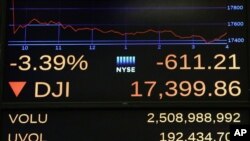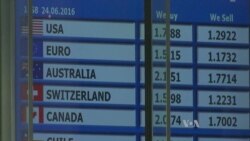The effects of Thursday’s Brexit vote — the United Kingdom’s referendum decision to part ways with the European Union — will continue to place pressure on world equity markets in the coming days, perhaps longer, Peter Costa, New York Stock Exchange (NYSE) governor and president of Empire Executions, told VOA from the trading floor.
“When China sneezes, the U.S. catches a cold. Now it’s Europe," Costa told VOA on Friday. “We’re all interdependent, it’s been that way for the last 15 years. We’re all going to be affected by it (Brexit).”
From the opening bell through the end of Friday’s trading, the Dow Jones Industrial average opened down more than 500 points, staged a brief comeback, but ended the day down 610 points, or 3.39 percent, its largest single-day sell-off over the past 10 months. The Nasdaq market, meanwhile, dropped 4.12 percent.
Nasdaq issued a statement in response to the reaction of global markets, saying, “We will act accordingly to fluctuations in volatility as necessary. Maintaining resiliency across all our markets for our customers and partners is at the absolute forefront for us.”
Despite what Costa described as an orderly pricing and execution strategy at the NYSE, he explained that the added pressure on world financial markets is likely to continue.
Additional displacement
Looking to trading next week, JJ Kinahan, chief market strategist at TD Ameritrade, explained to VOA in a phone interview that Friday’s market displacement will not be an isolated event.
“Those are normally three- to five-day trading events,” Kinahan said. Apart from existing uncertainty, Sunday’s Spanish election, he said, may lead to additional market displacement.
“It’s about a two-and-a-half-year process,” Kinahan said, referring to the time it will require for the UK to formalize its exit from the EU. “So it will be one of those things — you’ll have an initial reaction and it will calm down, then you will get some news out of it every few months after it, which will cause market movement.”
In a Friday press conference call, Sebastian Mallaby, senior fellow for International Economics at the Council on Foreign Relations (CFR), explained that the economic uncertainty to follow is difficult to model.
“They [economists] are more likely to underestimate the severity of the hits than to overestimate it because, when psychology kicks in and markets overshoot, that’s obviously when you get more trouble,” Mallaby said.
CFR President Richard N. Haass also noted, despite immediate market gyrations, the political uncertainty regarding the U.K.’s future may be even more consequential, calling the referendum “the beginning of the end of the United Kingdom.”
“The U.K. itself will not just be facing separatism, but the vote reveals a divided country geographically and generationally, politically.” As a result, the U.K. will be poorer, with less resources to devote to defense, ultimately diminishing its role in the world, Haass said.
“Britain has a peculiar economic vulnerability in the face of this kind of shock,” Mallaby added, “because of all the rich countries in the world right now, it runs the biggest current account deficit, which is to say it depends on foreign capital inflows to finance its imports to a greater extent than any other rich economy.”
Weekend signals
Despite high selloff in Friday’s trading session, TD Ameritrade’s Kinahan said Friday’s losses are no cause for widespread panic. He explained the S&P 500, which closed 76 points down, to 2,037, did not lose dramatically.
“It’s really just a bottom end of a range we’ve seen since mid-March, where we’ve been between basically 2,030 and 2,100,” Kinahan said, “so I don’t think it’s a reason to panic at all, and it actually at these levels has paid for people to be buyers over the last few months.”
Still, worldwide financial stocks were hit particularly hard in Friday’s trading. The reaction of central banks is a key factor to watch over the next couple of days, Mallaby said. He believes the central banks will attempt to stabilize the banking system and prevent further shock.
Costa, meanwhile, said investors will be listening closely to the EU for any comments over the weekend.
“I do think that the EU is probably going to mention the fact that they’re going to throw as much money as they possibly can to mitigate the effects of whatever this breakup is going to cause,” Costa said.
On the other hand, he added, no news is bad news. “If you hear nothing from them, I think that’s very, very negative.”






